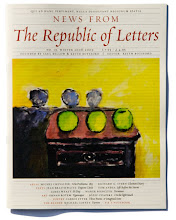One of the most curious and familiar aspects of our language is its very American facility for creating euphemisms. The America I acquired, aged eleven, in 1939, still had garbage men; it had a bureaucracy known as Personnel that made hiring and firing official. That wasn't Human Resources any more than garbage men were sanitation engineers. In military terms, I suppose the most familiar of these euphemisms is 'collateral damage' which means killing people more or less by mischance (or incompetence) when you didn't really mean to.
Because there is a serving officer among my children, I tend to read more about war than I otherwise would have. And because I was once, briefly, in Afghanistan -- a country mythical to my childhood for the Khyber Pass and the brave men who fought against 'rebel' Afghans -- I also tend to follow the progress of our conflict in those parts. It was with those interests in mind that I read in my TLS (November 20) that NATO calls our troops there 'stability enablers'. Our boys are there not to kill Taliban (aka the 'Anti-Coalition Militia, ACM) and flush out the 6'4" Osama bin Laden, but to enable stability, something other countries have been trying to do since the 1840s, with a conspicuous lack of success. This process involves training Afghans to do what we currently seek to do, maintain security. This is known as 'leveraging local capacity.' According to the author of the book under review (Patrick Hennessey, The Junior Officers' Reading Club) he and his fellow officers were there 'to play with the Afghans and to teach them to use their rifles for the time when the real soldiers had blown up all the Talibaddies and could hand a peaceful, if not prosperous province (Helmand) with smiles and handshakes and flag-ceremonies.'
As Henessey points out, however, few soldiers really know who it is they are fighting. The ACM, the Talibaddies, could be al-Qaeda, foreign jihadists, disgruntled poppy farmers, co-opted villagers or adventurers out for a bit of fun. Then the clever word-merchants devised 'Tier One' and 'Tier Two' baddies: the ideologists and irreducibles, and the Opportunists who might be 'included' in future negotiations. The army's squaddies, who do the actual fighting (according to my son who returned in April from a six-month tour there, largely to survive), use ordinary language: the enemy consists of 'flip-flops'.
Lahti
2 years ago













"Stability enablers" is a pretty funny euphemism but war has long been gussied up this way. More recently we also have what might be called "image euphemisms", as in post-September 11th when the media whited out the bodies falling from the towers, and in the Bushies refusal to allow photos of the bodies lying in Baghdad's streets when our soldiers arrived in 2003. And, stretching the point, we have "action euphemisms" with our drones where the "pilots" have dinner at home and the fact that people are killing other people is obscured.
ReplyDeleteto jdarr
ReplyDeleteBack in the days when I was working for Harry Evans' Sunday Times in London, much was made of the fixing of 'reality' by photographs such as studio images of heroically raising the flag on Iwo Jima. Harry found that as untrue as a story one could not back up. Once alerted, many other examples popped splendidly up. The baby crying on a bomb-blasted street in China during the Sino-Japanese wae, was transmuted into the portable Biafran baby, a kind of all-purpose tear-jerking kid who might turn up in the Balkan (Lebanese, Sudanese, Somali, etc.)wars. Like the 'shocked' crowds we see running about after explosions in Pakistan or Afghanistan, these images become tropes with a life of their own. Whiting out, Sir? Poor old Monsieur Hulot of the eponymous film lost his pipe to our masters of Correctness.